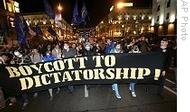-
(单词翻译:双击或拖选)
 |
| Opposition activists2 protest against the parliamentary elections shortly after polling closed, in the Belarusian capital Minsk, Sunday, 28 Sept. 2008 |
The United States, echoing the assessment3 of European observers, said it was disappointed that the September 28 parliamentary elections in Belarus fell significantly short of international standards. But Russia, Belarus' closest ally, praised the elections.
One-hundred-ten seats were at stake with 78 opposition candidates appearing on the ballot4. But when the final tally5 was counted, not a single candidate opposed to authoritarian6 President Alexander Lukashenko won a seat.
Analysts7 say Washington's criticism of the election process in Belarus was more muted than in the past, indicating there may be some movement toward better relations between Washington and Minsk.
Since Mr. Lukashenko came to power in 1994, western governments have consistently criticized his authoritarian methods, describing him as "the last dictator in Europe." Over the years he has consolidated8 power in the presidency9, controlled the press and cracked down on any form of dissent10.
The United States and the European Union have imposed sanctions on Belarus, including a travel ban on Mr. Lukashenko and senior government officials.
Robert Legvold from Columbia University, says the relationship between the United States and Belarus has blown hot and cold.
"Last year, in the context of the tensions over energy between Belarus and Russia, the Belarussians looked as though they wanted to explore opportunities to move forward a little bit with both the European Union and the United States. But then because there was very little progress on human rights and indeed a crackdown in early 2008, things cooled again. Lukashenko lost his temper, attacked the West in a speech in the spring and in April announced that 10 U.S. diplomats11 were going to be expelled: that is a very small embassy, it reduced to about four. Karen Stewart, our ambassador, had already left earlier when the Belarussians withdrew their ambassador from Washington. So at that point - in April and May - the relationship was at a low point," he said.
But later in the year, analysts say, it looked as if Mr. Lukashenko wanted to reach out to the West once again.
David Marples from the University of Edmonton [Alberta, Canada], says he gradually released all political prisoners, including in August former presidential candidate Alexander Kozulin - a key demand from the West.
"With the release of Alexander Kozulin, all political prisoners so designated by the United States have been set free by Belarus, which the United States interpreted as a positive sign. And so the United States, along with the European Union, said to Belarus that relations could really be improved provided that this election for parliament was free and fair. And unfortunately, that does not seem to have occurred," he said.
At a recent State Department briefing, deputy spokesman Robert Wood indicated the United States intends to maintain a dialogue with Belarus.
"We have very serious issues with Belarus - there is no question about that. And as we said, those elections were going to be a key point in determining how we go forward we are obviously disappointed that they did not meet up to international standards. And we are having conversations with our European allies about how we can help move the process forward," he said.
Robert Legvold from Columbia University says the Europeans want increased contacts with Belarus.
"They would like to have some kind of engagement with Belarus. But Lukashenko's very firm political hand and determination to keep it makes it virtually impossible. But I think the European Union is determined12 to continue on this road - and we will have to see," he said.
In the final analysis, Legvold says relations between Belarus, the European Union and the United States will depend on the relationship between Minsk and Moscow. If that relationship prospers13, Legvold says Mr. Lukashenko will have very little incentive14 to accommodate the concerns of Washington and the European Union. If, however, Minsk and Moscow do not see eye-to-eye and relations sour, Legvold says that will open up opportunities for the European Union and the United States to step in and move the relationship with Belarus in a positive direction.
 收听单词发音
收听单词发音
1
opposition

|
|
| n.反对,敌对 | |
参考例句: |
|
|
|
2
activists

|
|
| n.(政治活动的)积极分子,活动家( activist的名词复数 ) | |
参考例句: |
|
|
|
3
assessment

|
|
| n.评价;评估;对财产的估价,被估定的金额 | |
参考例句: |
|
|
|
4
ballot

|
|
| n.(不记名)投票,投票总数,投票权;vi.投票 | |
参考例句: |
|
|
|
5
tally

|
|
| n.计数器,记分,一致,测量;vt.计算,记录,使一致;vi.计算,记分,一致 | |
参考例句: |
|
|
|
6
authoritarian

|
|
| n./adj.专制(的),专制主义者,独裁主义者 | |
参考例句: |
|
|
|
7
analysts

|
|
| 分析家,化验员( analyst的名词复数 ) | |
参考例句: |
|
|
|
8
consolidated

|
|
| a.联合的 | |
参考例句: |
|
|
|
9
presidency

|
|
| n.总统(校长,总经理)的职位(任期) | |
参考例句: |
|
|
|
10
dissent

|
|
| n./v.不同意,持异议 | |
参考例句: |
|
|
|
11
diplomats

|
|
| n.外交官( diplomat的名词复数 );有手腕的人,善于交际的人 | |
参考例句: |
|
|
|
12
determined

|
|
| adj.坚定的;有决心的 | |
参考例句: |
|
|
|
13
prospers

|
|
| v.成功,兴旺( prosper的第三人称单数 ) | |
参考例句: |
|
|
|
14
incentive

|
|
| n.刺激;动力;鼓励;诱因;动机 | |
参考例句: |
|
|
|















